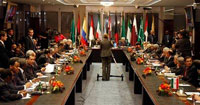Oil prices rise by more than one dollar
Oil prices edged just slightly higher Wednesday after OPEC vowed to abide by its quotas but decided not to take the more dramatic step of slashing production targets.

Prices rose by more than a dollar after the Organization of Petroleum Exporting Countries meeting ended in the pre-dawn hours in Vienna, Austria, but quickly eased as investors digested the significance of the cartel's decision.
Expectations that Hurricane Ike would pose little serious threat to U.S. Gulf of Mexico oil and gas installations also helped keep prices in check.
Light, sweet crude for October delivery rose 8 cents to US$103.34 a barrel in electronic trading on the New York Mercantile Exchange by afternoon in Dubai. The contract fell US$3.08 overnight to settle at US$103.26, the lowest close since April 1.
An OPEC statement issued after oil ministers ended their meeting said the organization had agreed to produce 28.8 million barrels a day. OPEC President Chakib Khelil said that quota in effect meant that member countries had agreed to cut back 520,000 barrels a day of excess production.
OPEC members regularly churn out oil above the organization's overall quota, last set in November at 27.3 million barrels a day. The new production limit is above that November quota, and the statement said it reflected adjustments to include new members Angola and Ecuador and exclude Iraq, as well as Indonesia, which is withdrawing from the cartel.
The move was viewed as a compromise meant to avoid new turmoil in crude markets while seeking to prevent prices from falling too far. But it also left investors scrambling to decipher the implications of the surprise announcement.
"Indonesia leaving OPEC but the formal inclusion of Angola and Ecuador is making for a statement clear as mud and for wide interpretations as to the desired level of OPEC production," analyst Olivier Jakob of Swiss trade advisory and risk management firm Petromatrix said in a note to investors.
Despite the confusion, a number of analysts said they did not expect the output decision to spark a sustained rally in oil prices, as investors remain concerned over slowing economic growth in the U.S, Europe and Japan.
"All they're saying is: 'we've been cheating for the past year.' ... I don't think the market's going to take it that seriously," analyst and trader Stephen Schork said by phone from Vienna. "I think the general mood is we are heading lower."
David Dugdale, a London-based energy analyst with MFC Global Investment Management, said he agreed that prices could continue to ease in the coming days because any tightening of supply to match OPEC quotas would take time to trickle down through the world's oil supply.
OPEC's compromise move, he added, could be read as either bullish for prices in that members are tightening the spigots, or bearish in the sense that the group could be anticipating a further drop-off in demand.
Keeping a lid on oil prices were expectations Hurricane Ike would veer to the west of the oil refineries and offshore drilling platforms of the Louisiana coast region.
By Wednesday morning in the U.S., Ike was a Category 1 storm about 145 miles (230 kilometers) north of the western tip of Cuba, moving northwest at 8 mph (13 kph) with maximum sustained winds near 85 mph.
It was expected to cross the Gulf of Mexico, strengthening to a Category 3 hurricane before making landfall in Texas or northern Mexico. That path would likely keep it well out of the way of Gulf Coast oil and gas installations.
"Just a few days ago it looked like it was heading for New Orleans and the coast of Louisiana," said John Vautrain, an energy analyst at consultancy Purvin & Gertz in Singapore. "Now Ike has come off the radar screen some and the market is discounting the threat of hurricane damage."
Investors are also waiting for the U.S. Energy Department's Energy Information Administration to release its report on U.S. oil stocks for the week ended Sept. 5 later in the day. The petroleum supply report was expected to show that oil stocks fell 3.9 million barrels, according to the average of analysts' estimates in a survey by energy information provider Platts.
The Platts survey also showed that analysts projected gasoline inventories fell 4.7 million barrels and distillates went down 2.3 million barrels during last week.
In other Nymex trading, heating oil futures rose less than a penny to US$2.9323 a gallon, while gasoline prices gained 2.89 cents to US$2.6815 a gallon. Natural gas for October delivery fell 3.9 cents to US$7.496 per 1,000 cubic feet.
In London, October Brent crude rose 29 cents to US$100.63 a barrel on the ICE Futures exchange.
Subscribe to Pravda.Ru Telegram channel, Facebook, RSS!





